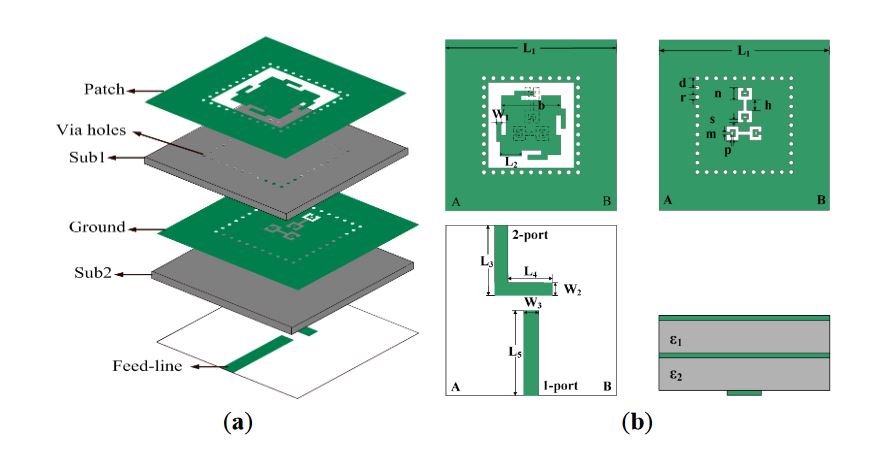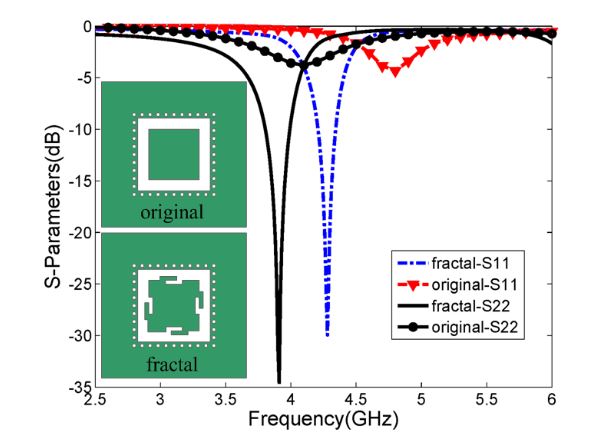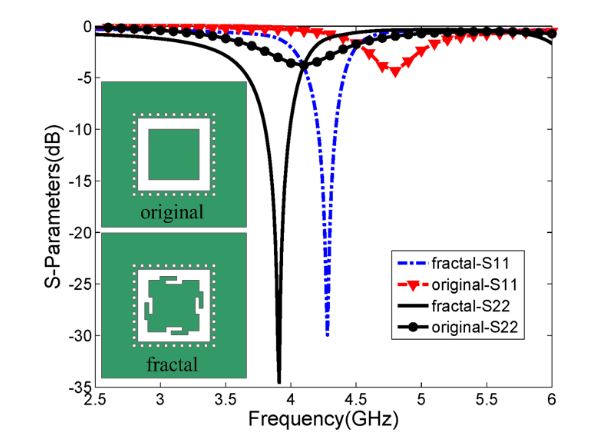ABSTRACT
This paper presents a novel compact dual-band and dual-polarized complementary split-ring resonator (CSRR)-fed substrate-integrated waveguide (SIW) cavity-backed fractal patch antenna for wireless energy harvesting and communication. The proposed antenna is composed of a Giuseppe Peano fractal radiation patch with a backed SIW cavity.
To enhance the bandwidth and minimize the dimensions, the CSRR structure is designed to feed the Giuseppe Peano fractal patch orthogonally. A prototype of the proposed antenna is simulated, fabricated and measured. The proposed antenna exhibits good directionality and high cross-polarization level with especially compact size.
DESIGN SECTION

Figure 1. Configuration of the proposed antenna: (a) 3-dimensional view; and (b) top and side view of each metallic layer
This sub-section presents the design procedure of the proposed antenna in detail. The geometrical parameters are illustrated in Figure 1. To minimize the mutual coupling between the feed lines and the patch, the feed lines are printed on the bottom la yer of the antenna. Two orthogonal feed ports, i.e., 1-port and 2-port, excite vertical and horizontal polarized waves, respectively.

Figure 3. Simulated return loss with different radiator shapes
As shown in Figure 3, the original square radiator resonated at both 4.1 GHz and 4.8 GHz. In comparison, the proposed Giuseppe Peano fractal radiator resonates at both 3.9 GHz and 4.3 GHz. With the Giuseppe Peano fractal geometry, the current of the proposed antenna should be forced to travel along the convoluted path instead of a straight Euclidean path.
RESULTS AND DISCUSSION

Figure 4. (a) Photograph of the proposed antenna; (b) Simulated and measured S11 and S22 of the proposed antenna
A photo of the fabricated antenna is illustrated in Figure 4a. The measured and simulated results of return loss in terms of S11 of the 1-port and S22 of the 2-port are displayed in Figure 4b. For the two polarizations, the measured values of S11 are −30 dB and −34 dB at their corresponding center frequencies.
CONCLUSIONS
In this paper, a novel compact dual-band and dual -polarized CSRR-fed SIW cavity-backed fractal patch antenna, which aims to work simultaneously for wireless energy harvesting and communication, is proposed and analyzed. It is shown that the combination of fractal geometries and the CSRR feed is effective in the design of compact SIW antennas. A prototype of the proposed antenna is simulated, fabricated and measured. The tendencies of the measured results are in agreement with those of the simulation.
The proposed antenna exhibits good gains and high cross-polarization levels, especially for the miniaturizations. In addition to the inherent advantages of significant surface wave suppression, excellent impedance matching, and a wider scan range, the proposed antenna has the advantages of low cost and good integration ability, which make it suitable for dual- band and dual-polarized applications and future wireless energy harvesting and communication array applications.
Source: Chongqing University
Authors: Hailin Cao | Fen Jiang | Jiujiu Liu | Wenbin Cai | Mingchun Tang | Xiaoheng Tan | Shizhong Yang
>> 60+ Antenna Communication Projects for Engineering Students